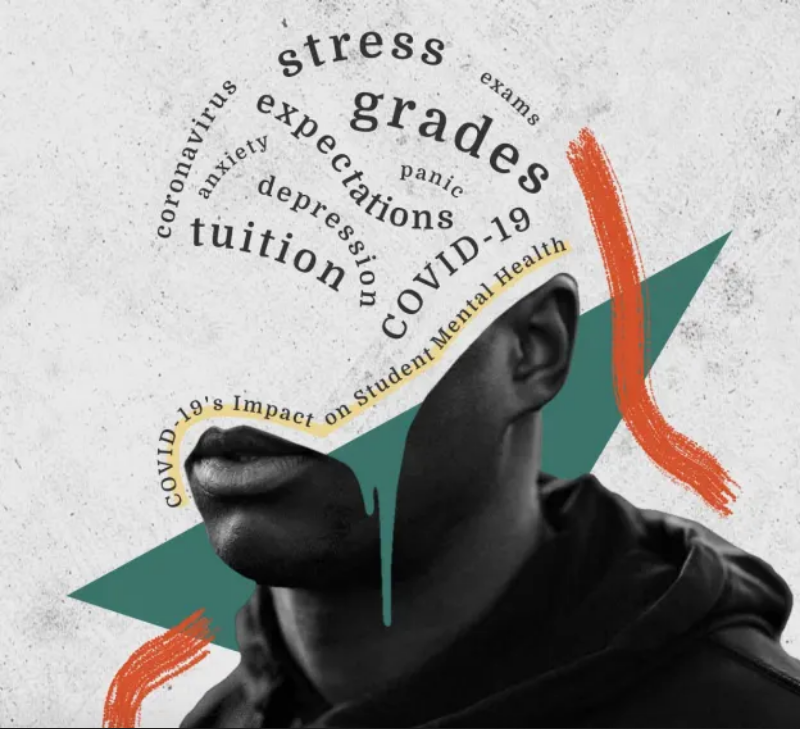Shorecrest’s Response to Students’ Mental Health
As the COVID-19 pandemic has shown us, it is crucial to connect with others. But with the continuation of online school, isolation has become the norm of many students’ daily life. As children, we look up to adults to help us and guide us to a prosperous future. In spite of COVID-19, Shorecrest has worked to empower students and help them thrive against adversity.

In the past 10 months of online learning, twelve months total from March to February, Shorecrest has stuck to its usual protocols in order to assure each student’s success and to provide equity to all. In an effort to understand what Shorecrest has specifically done to address mental health in the community, I sent out a survey to students and interviewed our Dean of Students, Ms. Clark. Many students reported that online learning had definitely put a strain on their mental health, to the point that 10 out of the 16 people who responded reported that online learning had contributed to or given them mental health issues. With no guarantee that students will return to school next year via hybrid, we can only hope that, as Ms. Clark says, “with the vaccine, we can safely be together soon!” Despite this uncertainty, Shorecrest has stayed with the pre-COVID protocols of helping students with 504s, IEPs, and special ed through “creating teams that include the student, their caregiver, the IEP manager, counselor, and teachers in order to figure out what will best serve the student.” For more information, check out “IEP Students Mental Health During Online School” on the Highland Piper Website. With new challenges come new solutions, and Shorecrest has implemented new guidelines to make the school year a little easier, one of them being the 3×3 schedule. The 3×3 schedule was designed, not only to reduce student workload but also to allow students to smoothly transition into a hybrid schedule. While many Shorecrest students have been able to adjust to their classes just fine, some students have been persistent about getting a schedule change due to various reasons. When reiterating the concern to Ms. Clark, she clarified “class switches are very difficult given the fact that we have to be able to take the classes hybrid (so classes have to be smaller). However, if you are ever unsatisfied with a response one staff member has given, you are always welcome to go to Ms. Gonzalez or me to make sure your needs are being met.” Another addition to our school schedule is daily Zoom meetings. To correct the confusion, Zoom classes (as stated by Ms. Clark) are not required but highly recommended. The point of the Zoom meeting is to be able to connect with other students, but mainly to learn new information from your teacher. But if working independently is more preferable, feel free to fill out the attendance form by 3:00 pm and complete the daily assigned work asynchronously. The school’s intentions to address student mental health is certainly heading in the right direction. As our Dean of Students exuberantly comments, “The surveys we have given have been really helpful and we’ve adjusted according to some of the feedback we’ve gotten (for example, changing the late-work policy and changing the turn in times for assignments). We also have Student Council and ASB Core as avenues to hear student concerns. Most teachers also give their students surveys and some of the feedback goes to the administration to make improvements.”
While it’s great to acknowledge the school’s actions, it’s important to see the perspective and opinions of those who experienced these conditions firsthand: the students. From the anonymous survey, an SC student speaks against the school’s actions with advice catered to students by students. “I legitimately enjoy my classes where my peers want to participate… The energy is contagious. I don’t even care if what they contribute is of poor quality, I just miss having that energetic atmosphere. And please, give help to the kids who need it most: the silent black boxes. Ask them why they don’t talk, and not through a survey to make some sweeping solution that helps no one, but on a one-to-one personal talk. Fix the problem if it is something preventing participation from them. If they’re apathetic, make a game plan and we offer support; you can’t make someone like school, online or not. If mental health is a priority, then make it clear to those running the school to do actions that reflect that value.”
Mental health is definitely an important topic and especially with the effects of online learning on students across the country, it is critical that we continue to keep this part of the conversation moving forward. While Shorecrest has definitely made the effort to help their students, will it really be enough to save them from their declining mental health?







